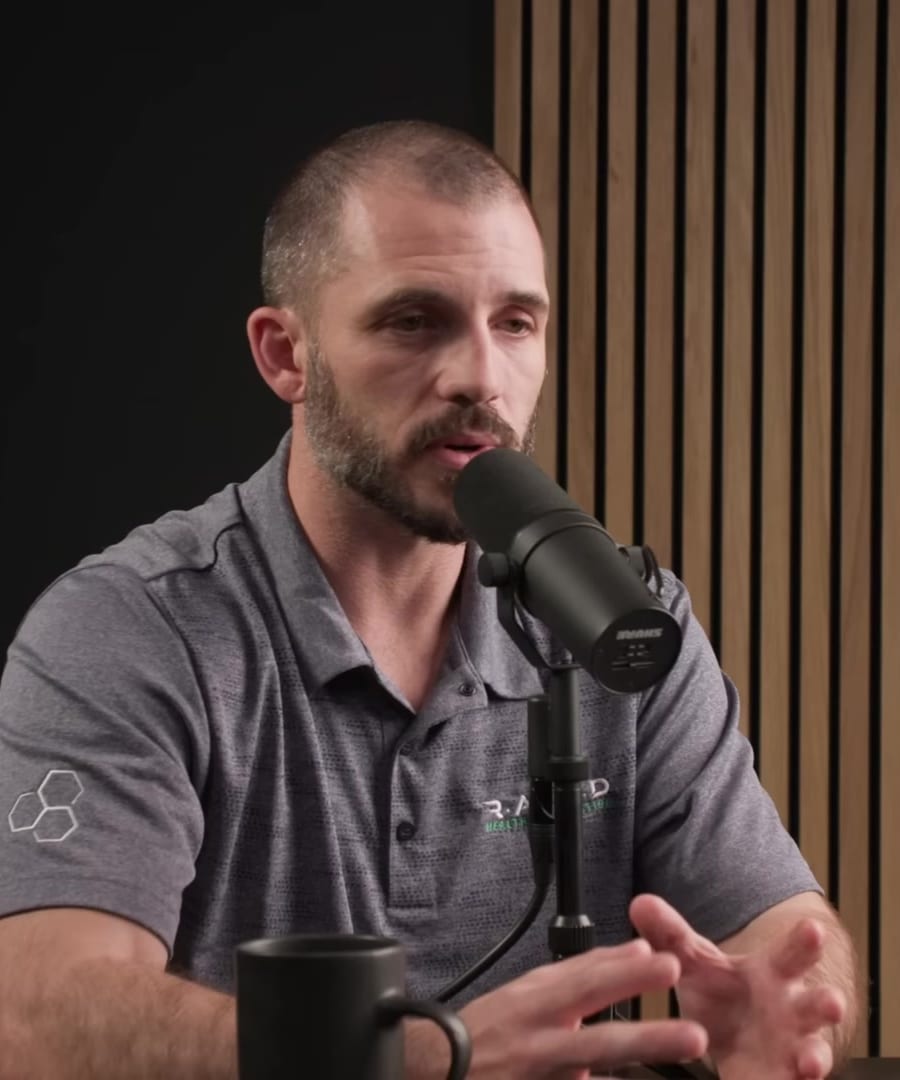Give me a meal plan to help me bulk from 173 to 185 in 4 months
Sources:
To gain weight and muscle from 173 to 185 pounds in four months, it is essential to have a well-balanced diet and consistent exercise regimen. and Layne Norton provide valuable insights on optimizing protein intake for muscle growth:
- Protein Distribution: Aim for around four to five meals per day, each containing at least 30 grams of quality protein, along with some starchy carbohydrates, fibrous carbohydrates, and fats. This approach can support muscle recovery and growth.
- Meal Timing: It's beneficial to have your first meal within an hour of waking up and your last meal within an hour of going to bed. Fill in the remaining meals throughout the day based on your schedule.
- Post-Workout Nutrition: Consuming a meal with adequate protein and carbohydrates after your workout can help significantly with muscle recovery and growth, especially after intense sessions like leg days.
Here is a sample meal plan:
Meal 1 (Breakfast):
- 3-4 eggs or a protein shake with 30g whey protein
- 1 cup oatmeal with fruits like berries or bananas
- 1 tbsp peanut butter or a handful of nuts
Meal 2 (Mid-Morning Snack):
- Greek yogurt with honey and granola
- A piece of fruit (apple, banana, etc.)
Meal 3 (Lunch):
- Grilled chicken breast or tofu (30-40g protein)
- 1 cup quinoa or brown rice
- Steamed vegetables (broccoli, carrots, spinach)
Meal 4 (Afternoon Snack):
- Cottage cheese with pineapple
- Whole grain crackers or a small salad
Meal 5 (Dinner):
- Salmon fillet or lean beef (30-40g protein)
- Sweet potato or whole grain pasta
- Mixed vegetables (peppers, zucchini, asparagus)
Meal 6 (Pre-Bed Snack):
- Protein shake or casein protein
- A small handful of nuts or a piece of fruit
Adhering to this meal plan and ensuring you maintain a caloric surplus tailored to your activity level and metabolism will help support your weight gain goals. For a more personalized plan, consider consulting a nutritionist or dietitian. 1
RELATED QUESTIONSWhat supplements help with muscle gain?
Sources:
For muscle gain, several supplements can be highly effective. Here are some recommendations based on the insights from and his guest experts:
-
Creatine: Creatine is one of the most well-studied and effective supplements for muscle hypertrophy and strength. highlights its benefits, which extend beyond muscle growth to include cognitive function and bone health. A daily dose of around 5 grams is typically recommended 1.
-
Whey Protein: Whey protein is a convenient way to ensure adequate protein intake, critical for muscle recovery and growth. suggests aiming for about 1 gram of protein per pound of body weight per day, with whey protein being a high-quality source that aids in reaching this target 2.
-
Branched-Chain Amino Acids (BCAAs): BCAAs, which include leucine, isoleucine, and valine, support muscle protein synthesis. However, advises against supplementing with leucine alone, recommending a balanced intake of these amino acids to optimize muscle health 3.
-
Magnesium: Magnesium supports muscle function and recovery. recommends a dose of around 6 mg per kg of body weight, particularly in the form of magnesium citrate 4.
-
Tart Cherry Juice: This can help reduce muscle soreness and improve recovery post-exercise, which can be beneficial for continuous training and muscle gain 4.
-
Vitamin D: Essential for bone health and muscle function, supplementing Vitamin D can support overall physical performance, especially if you have low levels 4.
Remember to combine these supplements with a balanced diet rich in whole foods and a structured exercise regimen for the best results. As always, consult a healthcare professional before starting any new supplement regimen.
RELATED QUESTIONS-
What supplements help with muscle recovery?
Sources:
For muscle recovery, several supplements are highlighted by experts on the . Here are some key recommendations:
-
Creatine: Well-known for its benefits in muscle recovery, it helps in reducing muscle damage and can even aid in fat loss and cognitive function 1.
-
Omega-3 Fatty Acids: These can be effective for managing inflammation post-exercise. Aim for 2-5 grams daily with a balanced EPA to DHA ratio 2 3.
-
Vitamin D: Important for reducing inflammation and aiding recovery. Low levels can impede muscle recovery and overall health 3.
-
Magnesium: Particularly Magnesium malate, which is effective in reducing delayed onset muscle soreness (DOMS). The recommended dosage is about 6 mg per kg of body weight 3 4.
-
Tart Cherry Juice: This can help reduce muscle soreness and inflammation. It's also beneficial for sleep, aiding overall recovery 3.
-
Curcumin: Effective for managing inflammation, with a typical dosage being 500 mg three times a day 2.
-
Caffeine: While not primarily a recovery supplement, caffeine can reduce muscle soreness and fatigue, supporting performance and recovery indirectly 5.
Each of these supplements has shown efficacy in enhancing muscle recovery by managing inflammation and supporting muscle repair. Always consult with a healthcare professional before starting any new supplementation regimen.
RELATED QUESTIONS-
What other supplements should I consider taking too
Sources:
In addition to the supplements highlighted earlier for muscle recovery, several others can support overall health and performance:
-
Beta-Alanine: Useful for high-intensity workouts. It helps delay fatigue, particularly for exercises lasting longer than 45-60 seconds 1.
-
Ashwagandha: Can modestly increase testosterone, improve lean mass, decrease stress hormones, and aid sleep 1.
-
Citrulline Malate: Reduces fatigue and may have small recovery benefits. Often used to increase time to fatigue during workouts 1.
-
Carnitine (Various Forms): Supports recovery and may increase androgen receptor density in muscle cells 1.
-
Rodeola and Curcumin: These have anti-inflammatory properties. Curcumin, in particular, is effective for managing inflammation with a typical dose of 500 mg, three times a day 1 2.
-
Food-based or Mimic Supplements: Whey protein, casein, and plant proteins are beneficial for muscle recovery and overall health. They provide essential nutrients that might not be present in other forms of supplementation 3.
-
Magnesium (Citrate or Other Forms): Essential for reducing delayed onset muscle soreness (DOMS) and supporting overall recovery. 6 mg per kg of body weight is a useful dosage 4.
-
Vitamin A and Zinc: Often covered in multivitamins, these micronutrients have mechanisms that support recovery and immune function 4.
Including these supplements in your regimen can provide comprehensive support for muscle recovery, performance, and overall health. Always consult with a healthcare professional before starting any new supplement regimen.
RELATED QUESTIONS-
What are the benefits of Beta-Alanine?
Sources:
Beta-Alanine offers significant benefits when taken consistently:
-
Fatigue Management: Beta-Alanine helps delay fatigue by serving as an acid buffer. It builds up in the muscles to create creatine, which blocks the buildup of hydrogen ions that cause muscle fatigue during high-intensity workouts 1.
-
Muscular Endurance: It is particularly effective for enhancing performance in activities lasting 60 to 240 seconds, such as interval training, rowing, and sprinting. This supplement supports exercises that mix anaerobic and aerobic efforts, thus improving muscular endurance and reducing fatigue 2.
-
Reduction of Body Fat and Increase in Lean Mass: Beta-Alanine has been shown to aid in the reduction of body fat and the improvement of lean muscle mass, making it a valuable supplement for fitness enthusiasts 2.
-
Safety and Cost-Effectiveness: This supplement is well-studied, safe, cheap, and effective across multiple domains of physical health and performance. It is a reliable aid for delaying the buildup of acid in muscles during exercise 3.
Ensure consistent use to experience these benefits, and consult a healthcare professional before starting any supplement regimen.
RELATED QUESTIONS-
Give me a meal plan to help me bulk from 173 to 185 in 4 months
- RELATED QUESTIONS
What supplements help with muscle gain?
- RELATED QUESTIONS
What supplements help with muscle recovery?
- RELATED QUESTIONS
What other supplements should I consider taking too
- RELATED QUESTIONS
What are the benefits of Beta-Alanine?
- RELATED QUESTIONS











